|
|
|
Sort Order |
|
|
|
Items / Page
|
|
|
|
|
|
|
| Srl | Item |
| 1 |
ID:
064387
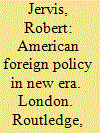

|
|
|
|
|
| Publication |
London, Routledge, 2005.
|
| Description |
ix, 184p.
|
| Standard Number |
0415951003
|
|
|
|
|
|
|
|
|
|
|
|
Copies: C:1/I:0,R:0,Q:0
Circulation
| Accession# | Call# | Current Location | Status | Policy | Location |
| 049867 | 327.73/JER 049867 | Main | On Shelf | General | |
|
|
|
|
| 2 |
ID:
058828
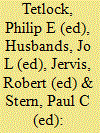

|
|
|
|
|
| Publication |
New York, Oxford University Press, 1989.
|
| Description |
v.1(viii, 401p.)
|
| Standard Number |
0195057651
|
|
|
|
|
|
|
|
|
|
|
|
Copies: C:1/I:0,R:0,Q:0
Circulation
| Accession# | Call# | Current Location | Status | Policy | Location |
| 032253 | 355.027/TET 032253 | Main | On Shelf | General | |
|
|
|
|
| 3 |
ID:
107164
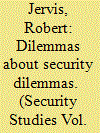

|
|
|
| 4 |
ID:
121403
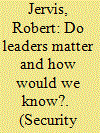

|
|
|
|
|
| Publication |
2013.
|
| Summary/Abstract |
This paper will explore the ambivalence or conflict in the literature about the extent to which leaders matter in international politics, commonly linked to the level-of-analysis question. One the one hand, national leaders are often larger than life figures with strong preferences and distinctive personalities who seem to leave their stamp on events. On the other hand, most ir scholars place great stress on the incentives and constraints posed by the environment, be it domestic or international. I will proceed in four sections. The first discusses the essential claims at stake, the kinds of evidence that could be adduced to support one position or the other, and the pathways by which individual differences can make themselves felt. The second section examines the implications for morality, responsibility, and democratic theory. This discussion too will point to relevant methods, including ones that are contested. I will then turn to post-Cold War American foreign policy, skeptically examine the claim that individual presidents, even George W. Bush, mattered as much as is generally believed and close by discussing the implications for democratic accountability and control.
|
|
|
|
|
|
|
|
|
|
|
|
|
|
|
|
| 5 |
ID:
113337
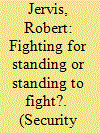

|
|
|
| 6 |
ID:
110844


|
|
|
|
|
| Publication |
2011.
|
| Summary/Abstract |
Recent world politics displays two seemingly contradictory trends: on the one hand, the incidence of international and even civil war shows a very great decline, but on the other hand the US, and to a lesser extent Britain and France, have been involved in many military adventures since the end of the Cold War. The causes are numerous, but among them is the unipolar structure of world politics, which presents the US with different kinds of threats and new opportunities. Central also is the existence of a security community among the leading states. A number of forces and events could undermine it, but they seem unlikely to occur. Even in this better world, however, recessed violence will still play a significant role, and force, like other forms of power, is most potent and useful when it remains far in the background.
|
|
|
|
|
|
|
|
|
|
|
|
|
|
|
|
| 7 |
ID:
174251
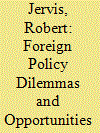

|
|
|
|
|
| Summary/Abstract |
THERE IS A CONSIDERABLE CHANCE that the Democrats will win the presidential election in November and whether one approves of this outcome or not, it is worth thinking about what a new administration’s foreign policy would look like. Although in politics nothing is certain, as the sole remaining Democratic candidate Joe Biden is very likely to be the nominee and I will use the male pronoun when referring to the new president. He probably will bring with him many officials who had previously served him and President Barack Obama, and while the knowledge and experience of this cohort will be a major asset, the counterpart hazard is the impulse to urge policies that mimic or vindicate Obama’s. It is not necessary to deny the considerable achievements of that administration to note that the world now presents the country with new dangers and new opportunities.
|
|
|
|
|
|
|
|
|
|
|
|
|
|
|
|
| 8 |
ID:
069211
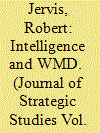

|
|
|
| 9 |
ID:
173429
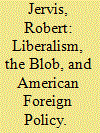

|
|
|
|
|
| Summary/Abstract |
John J. Mearsheimer and Stephen M. Walt argue that American foreign policy since the end of the Cold War has been a failure and that the reasons stem from the American domestic political system. For Mearsheimer, a prevailing form of Liberalism is at fault; for Walt it is the consensus of the foreign policy establishment (“the Blob”). These arguments have much to be said for them but are not supported by adequate evidence because both authors neglect standard methods of verification: counterfactuals, the applications of the hypothetico-deductive method, and the use of comparisons to countries or cases in which the posited independent variable is absent. Examining the arguments in this light brings out weaknesses and opportunities for further testing, highlights the tension between the explanatory and the normative aspects of realist theorizing, and points to other cases in which the impact of the situation is discounted.
|
|
|
|
|
|
|
|
|
|
|
|
|
|
|
|
| 10 |
ID:
044198
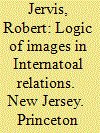

|
|
|
|
|
| Publication |
New Jersey, Princeton University Press, 1970.
|
| Description |
xi, 281p.
|
| Standard Number |
0691075328
|
|
|
|
|
|
|
|
|
|
|
|
Copies: C:1/I:0,R:0,Q:0
Circulation
| Accession# | Call# | Current Location | Status | Policy | Location |
| 025655 | 327/JER 025655 | Main | On Shelf | General | |
|
|
|
|
| 11 |
ID:
057764
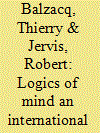

|
|
|
| 12 |
ID:
059924
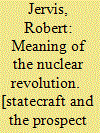

|
|
|
|
|
| Publication |
Ithaca, Cornell University Press, 1989.
|
| Description |
x, 266p.
|
| Series |
Cornell studies in security affairs
|
| Standard Number |
080142304X
|
|
|
|
|
|
|
|
|
|
|
|
Copies: C:1/I:0,R:0,Q:0
Circulation
| Accession# | Call# | Current Location | Status | Policy | Location |
| 031490 | 355.0217/JER 031490 | Main | On Shelf | General | |
|
|
|
|
| 13 |
ID:
151433
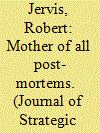

|
|
|
|
|
| Summary/Abstract |
The most striking finding of the Chilcot Report is that the record reveals little that was previously unknown. A key point for its authors is that diplomatic alternatives had not been exhausted when the US and UK went to war. But, short of an armed attack by the other side, it is hard to say when they would have been. Here what was crucial was the belief shared by Bush and Blair that Saddam Hussain would not and could not change. For the British the issue of whether alternatives to war remained is particularly important because of its implications for international law, something that did not trouble the Americans. It remains unclear if Blair would have gained or lost leverage over Bush had he made British participation contingent on better American policy, for example on developing a workable plan for the reconstruction of Iraq.
|
|
|
|
|
|
|
|
|
|
|
|
|
|
|
|
| 14 |
ID:
158871
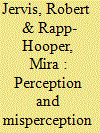

|
|
|
|
|
| Summary/Abstract |
North Korea has all but completed its quest for nuclear weapons. It has demonstrated its ability to produce boosted-fission bombs and may be able to make fusion ones, as well. It can likely miniaturize them to fit atop a missile. And it will soon be able to deliver this payload to the continental United States. North Korea’s leader, Kim Jong Un, has declared his country’s nuclear deterrent [1] complete and, despite his willingness to meet with U.S. President Donald Trump, is unlikely to give it up. Yet Washington continues to demand that Pyongyang relinquish the nuclear weapons it already has, and the Trump administration has pledged that the North Korean regime will never acquire a nuclear missile that can hit the United States. The result is a new, more dangerous phase in the U.S.–North Korean relationship: a high-stakes nuclear standoff.
|
|
|
|
|
|
|
|
|
|
|
|
|
|
|
|
| 15 |
ID:
101322
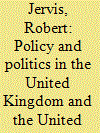

|
|
|
|
|
| Publication |
2011.
|
| Summary/Abstract |
Robert Jervis examines policy and politics in the United Kingdom and the United States. He offers a review and assessment of the recently published autobiography, A Journey: My Political Life by Tony Blair and Bob Woodward's Obama's Wars.
|
|
|
|
|
|
|
|
|
|
|
|
|
|
|
|
| 16 |
ID:
118165
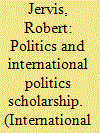

|
|
|
| 17 |
ID:
148134
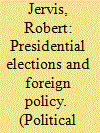

|
|
|
|
|
| Summary/Abstract |
In this special issue of PSQ analyzes the role of foreign policy in the current presidential campaign. He argues that even in this era dominated by domestic concerns, foreign policy issues matter for the national welfare.
|
|
|
|
|
|
|
|
|
|
|
|
|
|
|
|
| 18 |
ID:
001627
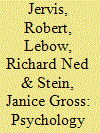

|
|
|
|
|
| Publication |
London, Johns Hopkins University, 1985.
|
| Description |
xx, 270p.
|
| Standard Number |
0801838428
|
|
|
|
|
|
|
|
|
|
|
|
Copies: C:1/I:0,R:0,Q:0
Circulation
| Accession# | Call# | Current Location | Status | Policy | Location |
| 041229 | 355.0217/JER 041229 | Main | On Shelf | General | |
|
|
|
|
| 19 |
ID:
179163
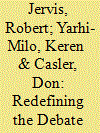

|
|
|
|
|
| Summary/Abstract |
A wave of recent scholarship has breathed new life into the study of reputation and credibility in international politics. In this review article, the authors welcome this development while offering a framework for evaluating collective progress, a series of related critiques, and a set of suggestions for future research. The article details how the books under review represent an important step toward consensus on the importance of reputation in world politics, elucidating scope conditions for when reputational inferences are likely to be most salient. The authors argue that despite the significant accomplishments of recent studies, the scholarly record remains thin on the psychology of the perceiver and is instead focused on situational factors at the expense of dispositional variables and is rather myopically oriented toward reputation for resolve to the exclusion of other important types. Despite its contributions, the new literature still falls short of a full explanation for how actors draw inferences about reputation. These remaining theoretical challenges demand scholarly attention and suggest a role for psychology in filling some of the gaps.
|
|
|
|
|
|
|
|
|
|
|
|
|
|
|
|
| 20 |
ID:
070905
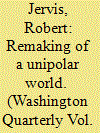

|
|
|
|
|
| Publication |
2006.
|
| Summary/Abstract |
No state should have a greater stake in preserving the international system than its hegemon. Yet, the United States is behaving more like a revolutionary state than a status quo power. Why? The answer transcends both September 11 and President Bush himself
|
|
|
|
|
|
|
|
|
|
|
|
|
|
|
|
|
|
|
|
|